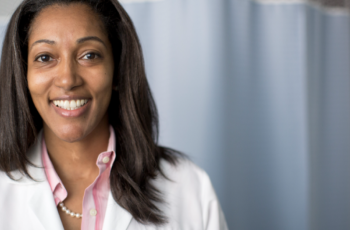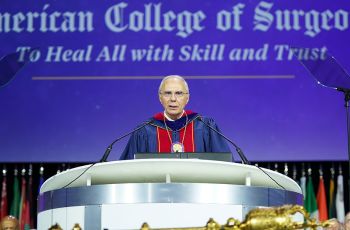According to the Centers for Disease Control and Prevention (CDC), an estimated 93 million adults in the United States are at high risk for serious vision loss annually, making periodic eye exams a critical piece of an effective annual health care plan. Here, Mehdi Tavakoli, MD, assistant professor of ophthalmology at the George Washington University (GW) School of Medicine and Health Sciences, and director of oculoplastics, neuro-ophthalmology, and adult strabismus division at The GW Medical Faculty Associates (GW MFA) discusses the benefits of regular check ups and eye care with your ophthalmologist.
Why should people get an annual eye exam, particularly if their vision seems fine?
Tavakoli: An annual eye exam is important for several reasons, even if your vision seems fine. While many people associate eye exams solely with checking for changes in vision, there are other crucial aspects of eye health that can be evaluated during these exams.
Many eye conditions, such as glaucoma, macular degeneration, and diabetic retinopathy, don’t always present noticeable symptoms in their early stages. Regular eye exams can help detect these conditions before they cause significant vision loss, allowing for timely treatment and management.
The eyes also offer sights into your overall health. During an eye exam, an optometrist or ophthalmologist may identify signs of systemic health issues such as diabetes, high blood pressure, or even certain types of cancers.
Even if your vision seems fine, it can change gradually over time. Regular eye exams help ensure that your eyeglass or contact lens prescription is up-to-date, providing you with the best possible vision correction.
Regular exams are especially important for children. Undiagnosed vision problems can affect a child’s learning and development. Early detection of issues like amblyopia (lazy eye) or strabismus (crossed eyes) is crucial for proper treatment.
What are some of the most common eye disorders and diseases that can be identified during an annual eye exam?
Tavakoli: Even if you don’t currently experience noticeable symptoms, an eye exam can identify a number eye disorders and diseases.
- Refractive errors, such as near-sightedness (myopia), farsightedness (hyperopia), and astigmatism, all cause blurred vision and can be corrected with eyeglasses, contact lenses, or refractive surgery.
- Glaucoma is a group of eye conditions that damage the optic nerve, often due to increased intraocular pressure. If left untreated, it can lead to gradual vision loss.
- Age-related macular degeneration (AMD) affects the central vision and can cause blurred or distorted vision. Regular eye exams can help identify signs of AMD early, enabling timely treatment.
- Cataracts cause the lens of the eye to become cloudy, leading to decreased vision. Cataract development is common with age, and an eye exam can help monitor their progression.
- Diabetic retinopathy occurs in people with diabetes and affects the blood vessels in the retina. Early detection through eye exams is crucial to prevent vision loss.
- Dry eye syndrome occurs when the eyes don’t produce enough tears or the tears evaporate too quickly. Symptoms include dryness, irritation, and discomfort.
- Strabismus, also known as crossed eyes or misalignment of the eyes, can be detected during an eye exam, especially in children. Early treatment is important for proper vision development.
- Amblyopia, or Lazy Eye, occurs when one eye has weaker vision than the other due to an uncorrected refractive error or misalignment. Detecting it early in childhood is crucial for treatment success.
- High blood pressure can affect the blood vessels in the retina, leading to hypertensive retinopathy. An eye exam can reveal signs of this condition.
Can having an annual exam identify other health concerns?
Tavakoli: An annual eye exam can potentially identify other health concerns beyond just eye-related issues. The eyes are interconnected with various systems in the body, and certain health conditions can manifest signs or changes in the eyes that an eye care professional might notice during an exam. Diabetes, high blood pressure, thyroid disorders, and certain autoimmune diseases are all examples of serious health problems whose symptoms can sometimes be spotted during an eye exam.
It’s important to note that while an eye exam can raise concerns about potential health issues, it typically serves as a starting point for further evaluation and testing by the appropriate medical specialists. Eye care professionals may collaborate with other healthcare providers to ensure comprehensive care if additional health concerns are identified during the exam.
What can a patient do if a routine screening identifies something serious such as the early stages of glaucoma, age-related macular degeneration or diabetic retinopathy?
Tavakoli: If a routine screening identifies something serious like the early stages of glaucoma, age-related macular degeneration, or diabetic retinopathy, it’s important for the patient to take proactive steps to manage their condition and preserve their eye health.
The first and most important step is to schedule an appointment with an ophthalmologist, who specializes in the specific condition that was identified. These specialists can provide a more detailed assessment, confirm the diagnosis, and recommend an appropriate treatment plan.
Educate yourself about the condition you’ve been diagnosed with. Understand its causes, progression, potential complications, and available treatment options. Ask your eye care specialist for informational resources or reliable sources of information.
The Department of Ophthalmology at The GW Medical Faculty Associates is staffed by nationally and internationally recognized clinicians and educators, combining the excellence of academic medicine with cutting-edge clinical services. Our team of physicians features board-certified specialists in all sub-specialties of ophthalmology, providing diagnostic, therapeutic, and surgical expertise in the treatment of cataracts, glaucoma, diabetic retinopathy, macular degeneration and related eye diseases.
Remember that early detection and proactive management are key to preventing further vision loss and maintaining good eye health. Work closely with your eye care specialist to create a personalized plan that addresses your specific needs and concerns.
To make an appointment with an ophthalmologist, visit the GW MFA Department of Ophthalmology or call 202-741-2800.



